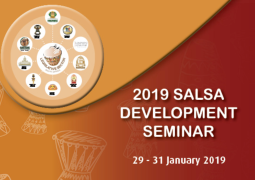
South Africa and the entire developing world will have to embark on massive reskilling programmes and revamp their education systems to prepare their populations for the radical technological changes that will come with the Fourth Industrial Revolution, a disruptive advancement in digital technology that will have a major impact on every industry across the globe.
This observation emerged during a discussion on the topic: “The Fourth Industrial Revolution – the Impact on South Africa and the Legislative Sector”, on the first day of the three-day seminar of the South African Legislative Sector currently under way in Cape Town.
The discussions on this global topic, which is receiving mixed reactions from the world, was opened by Ms Suzanne Hattingh, a Managing Director of consulting firm Performance Improvement Solutions, with a detailed presentation on the possible impact of the Fourth Industrial Revolution and what countries could do to make the revolution less disruptive to society.
She said “implication is going to be massive” and that “there is not a single industry in the world that will not be affected by this eminent change”.
Contrary to popular views that the Fourth Industrial Revolution was still coming, Ms Hattingh told the seminar that “we are already in the Fourth Industrial Revolution”, giving examples of countries where robots are replacing human beings in some jobs.
“We are already in the Fourth Industrial Revolution, it’s not something that is still coming it is already here, look at Uber the biggest taxi company with no taxis and Amazon, the biggest bookshop with no books – only reason these companies exist is through technology,” she told the gathering of administrators from Parliament and the nine provincial legislatures, which was also attended by National Assembly Deputy Speaker Mr Lechesa Tsenoli and the Speaker of the Western Provincial Legislature Ms Shanaz Fernandez.
Even though the Fourth Industrial Revolution will bring major improvements in the world, the major concern for the South African Legislative Sector, was the threat to jobs, with some jobs reportedly going to be redundant in the future.
With a highly computerised workforce in future, Ms Hattingh said, new fields will open up in information technology and software development but for societies to adapt they will need re-education and workers will need to learn new skill in order to survive.
“We will definitely need new skills, and the big question is how do we prepare the country for this destructive change when a large partition of the population is not prepared for even the Third Industrial Revolution, how are they going to survive in the new economy where an estimated 5.7 million jobs are at risk to automation, we need to make sure that the new technology benefits that largest number of people to make the revolution as peaceful as possible”, she said.
Ms Hattingh added that some jobs will become redundant; retraining and reskilling – 50% of what we know now is totally irrelevant – impact on the labour market, technology making people skills obsolete, economically devaluing them; make sure new technology benefits the largest number of people to ensure the revolution is peaceful.
Taking part in the discussion, Ms Bridget Mdluli from the North West Provincial Legislature, said the legislative sector (Parliament and the Provincial Legislatures) should advocate for policy framework that will manage the Fourth Industrial Revolution to make it less disruptive, especially in the labour sector. “We will strike a balance between the new technology and human beings, while the Fourth Industrial Revolution is very helpful, it also has detrimental elements especially in the developing world,” she said.
By Sakhile Mokoena
29 January 2019

